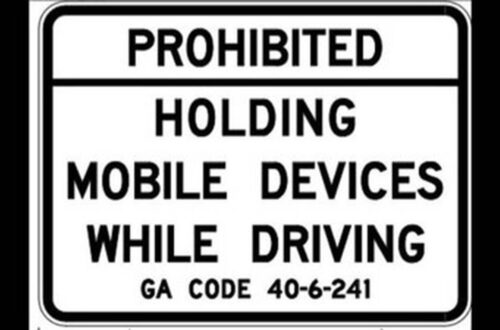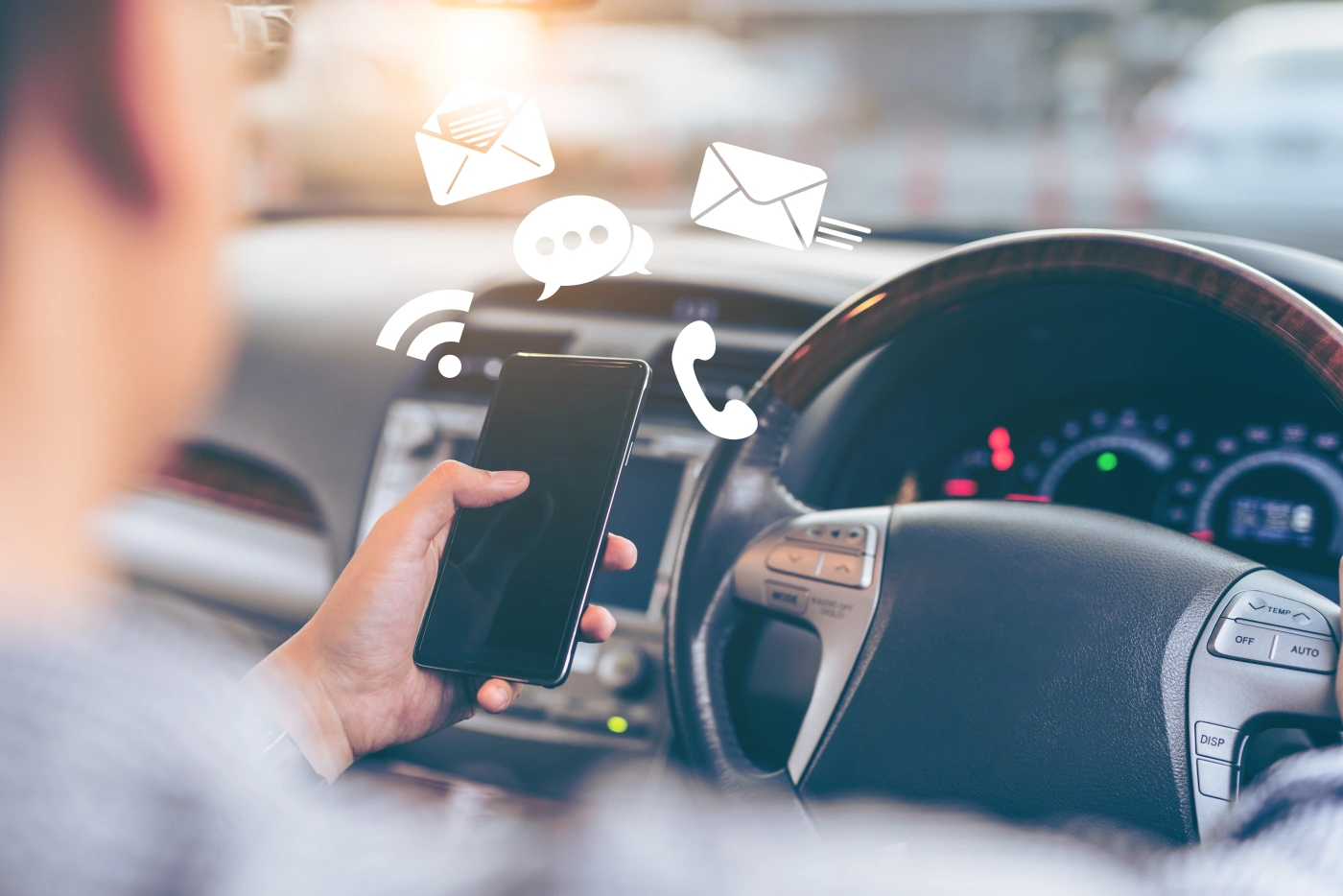Texting while driving puts lives at risk by causing distractions, slowing down your reactions, and often leading to tragic accidents. The act diverts your attention, impairs your ability to react quickly, and markedly increases the chances of a collision on the road. Remember, understanding these dangers can help you make safer choices behind the wheel.
Distraction Behind the Wheel
When you text while driving, you significantly increase the risk of accidents due to distraction behind the wheel. Your attention is split between the road and your phone, leading to delayed reactions and poor decision-making. Every text you send or read takes your focus away from the task of driving safely.
Not only does texting while driving impact your ability to react quickly to unexpected situations on the road, but it also hinders your awareness of your surroundings. You may miss important visual and auditory cues, such as brake lights from the car in front of you or the sound of a horn warning you of danger.
The consequences of being distracted while driving can be severe. A moment of inattention could result in a fender bender, a serious collision, or even a fatal accident. It is vital to prioritize safety and avoid any distractions that divert your focus away from the road. Remember, no text message is worth risking your life or the lives of others on the road.
Impaired Reaction Time
Engaging in texting while driving greatly impairs your reaction time on the road, posing a serious risk to your safety and that of others around you. When you divert your attention to read or send a text, your brain is not fully focused on the task of driving. This divided attention leads to delayed responses to unexpected situations on the road.
Imagine a scenario where a car suddenly swerves into your lane. In a split second, you need to react to avoid a collision. However, if you are texting, your reaction time is markedly slowed down. Studies have shown that texting while driving can increase your reaction time by up to three times compared to when you are fully attentive. This delay can make the difference between safely avoiding a potential accident and getting involved in a dangerous crash.
Increased Risk of Accidents
Texting while driving greatly increases the likelihood of accidents occurring due to the divided attention it causes. When you focus on composing or reading a text message, your eyes are off the road, hands are off the wheel, and mind is not fully engaged in driving. This split focus markedly impairs your ability to react promptly to sudden changes in traffic conditions, increasing the risk of collisions.
Studies have shown that texting while driving makes you 23 times more likely to be involved in a crash. Even a momentary lapse in attention can have devastating consequences on the road. The seconds it takes to glance down at your phone could mean the difference between a safe journey and a life-altering accident.
Legal Consequences and Fines
Driving while texting can result in severe legal consequences and hefty fines. In many places, texting while driving is considered a primary offense, meaning law enforcement can pull you over solely for that violation. If caught, you may face fines ranging from $100 to $1000 or more, depending on the jurisdiction. These fines can have a substantial impact on your finances and lead to increased insurance premiums. Additionally, some areas impose license suspensions for texting while driving, further restricting your ability to operate a vehicle legally.
Moreover, the legal repercussions extend beyond just fines. In some cases, texting while driving can result in criminal charges, especially if an accident occurs due to your distraction. These charges can lead to a criminal record, potential jail time, and a tarnished reputation. Understanding the gravity of the legal consequences associated with texting while driving and prioritizing the safety of yourself and others on the road is crucial.
Loss of Focus on the Road
Constantly glancing down at your phone screen while behind the wheel diverts your attention from the road ahead, endangering yourself and others. Your eyes should be focused on the traffic, pedestrians, and potential hazards around you. When you take your eyes off the road, even for a few seconds, you increase the risk of accidents considerably. In those moments, you are unable to react promptly to sudden changes in traffic flow, such as a car stopping abruptly or a pedestrian crossing the street.
Moreover, losing focus on the road due to texting while driving affects your ability to maintain a safe speed and proper lane position. Without proper attention, you might drift between lanes, miss important road signs, or fail to notice traffic signals changing. These lapses in concentration not only jeopardize your safety but also put other road users in harm's way. Remember, a moment of distraction can have lasting consequences. Stay alert, keep your eyes on the road, and prioritize safety for yourself and everyone sharing the streets with you.
Impact on Pedestrians and Cyclists
Being distracted on the road by using your phone can have serious consequences for pedestrians and cyclists sharing the streets with you. When you text and drive, your attention is taken away from the road, making it more likely for you to miss pedestrians crossing the street or cyclists sharing the road with you. This can lead to devastating accidents where vulnerable road users are put at risk.
Pedestrians rely on drivers to be alert and aware of their surroundings. By texting while driving, you are not only breaking the law in many places but also endangering the lives of those walking near the road. A moment of distraction can result in a pedestrian being hit or a cyclist being run off the road, causing severe injuries or even fatalities.
It's essential to prioritize safety for all road users, including pedestrians and cyclists. By staying focused on the road and refraining from using your phone while driving, you can help prevent accidents and safeguard the well-being of everyone sharing the streets with you.
Cognitive Overload While Driving
When you engage in texting while behind the wheel, your brain faces cognitive overload, greatly impairing your ability to react swiftly to potential hazards on the road. This cognitive overload occurs because your brain is trying to focus on two complex tasks simultaneously – driving and texting. Here are three ways cognitive overload while driving can lead to severe consequences:
- Delayed Reaction Time: Your brain struggles to quickly process information and react promptly to sudden changes in traffic conditions when distracted by texting.
- Impaired Decision Making: Cognitive overload can lead to poor decision-making skills while driving, such as misjudging distances, speeds, or failing to interpret road signs accurately.
- Decreased Awareness of Surroundings: Your attention is diverted from the road ahead, causing you to miss important visual and auditory cues that are essential for safe driving.
Lack of Awareness of Surroundings
With your focus divided between texting and driving, your awareness of your surroundings diminishes, putting you and others at risk on the road. When you engage in texting while driving, your attention is drawn away from the vital task of operating a vehicle safely. This lack of awareness means you may miss important visual and auditory cues on the road, such as traffic signals, pedestrian crossings, or the movements of other vehicles. As a result, you are more likely to make sudden maneuvers without proper signaling, increasing the chances of causing accidents.
Moreover, your reduced awareness of your surroundings can lead to delayed reactions in critical situations. For instance, if a car suddenly brakes in front of you or a pedestrian steps onto the crosswalk, your distracted state may prevent you from responding promptly to avoid a collision. By failing to stay fully alert while driving, you not only jeopardize your own safety but also endanger the lives of pedestrians, cyclists, and other drivers sharing the road with you.
Potential for Deadly Collisions
Texting while driving greatly elevates the risk of deadly collisions on the road due to impaired focus and delayed reactions. When you choose to engage with your phone instead of the road ahead, you are putting yourself and others in grave danger. Here's why texting while driving can lead to fatal accidents:
- Distracted Driving: Your attention is divided between texting and driving, making it harder to react promptly to sudden changes on the road.
- Decreased Reaction Time: Typing out a message takes your hands off the wheel and your eyes off the road, causing delays in reacting to potential hazards.
- Increased Likelihood of Accidents: The combination of reduced focus, delayed reactions, and impaired decision-making significantly raises the chances of being involved in a deadly collision.
Emotional and Psychological Effects
Engaging in texting while driving can have profound emotional and psychological effects on your well-being and mental state. The constant urge to check your phone for messages or notifications can create feelings of anxiety and stress, as you may feel compelled to respond immediately, even while behind the wheel. This can lead to a sense of being constantly on edge and distracted, affecting your ability to focus on the road ahead.
Moreover, the guilt and regret that may follow if you cause or are involved in an accident due to texting while driving can have long-lasting emotional consequences. The weight of knowing that your actions led to harm or even loss of life can trigger feelings of depression, trauma, and self-blame. These emotional burdens can impact your mental health and overall well-being, potentially leading to difficulties in relationships, work, and daily functioning.
Frequently Asked Questions
How Does Texting While Driving Specifically Impact a Driver's Ability to Navigate Through Traffic?
When you text while driving, your attention shifts from the road to your phone. This distraction impairs your ability to navigate through traffic safely, increasing the risk of accidents, injuries, and even fatalities.
Are There Any Studies That Show a Correlation Between Texting While Driving and Long-Term Physical Health Effects?
Yes, there are numerous studies that demonstrate a direct link between texting while driving and long-term physical health effects. These include neck strain, back issues, eye strain, and increased risk of accidents.
How Does Texting While Driving Affect a Driver's Ability to Respond to Emergency Situations on the Road?
Texting while driving diminishes your ability to respond quickly to emergencies on the road. It distracts your focus, delays your reactions, and increases the risk of accidents. Stay safe by avoiding distractions and keeping your attention on driving.
Can Using Voice-To-Text Technologies While Driving Be Just as Dangerous as Physically Typing Out a Message?
Using voice-to-text technologies while driving can still be dangerous as it diverts your attention from the road. Just speaking the message doesn't eliminate the cognitive distraction. Stay focused on driving to guarantee safety.
Are There Any Specific Strategies or Interventions That Have Been Proven Effective in Preventing Texting While Driving Behaviors?
To prevent texting while driving, try setting your phone to Do Not Disturb mode, using apps that block incoming messages, or simply placing your phone out of reach. These strategies can help keep you safe on the road.
Conclusion
So next time you think about sending that quick text while driving, remember the severe consequences it can lead to. From impaired reaction time to increased risk of accidents, texting behind the wheel is never worth it. Stay safe, stay focused, and keep your eyes on the road. Your life and the lives of others on the road depend on it. Don't let a text message be the reason for a tragic outcome.



